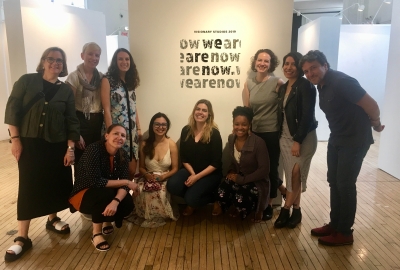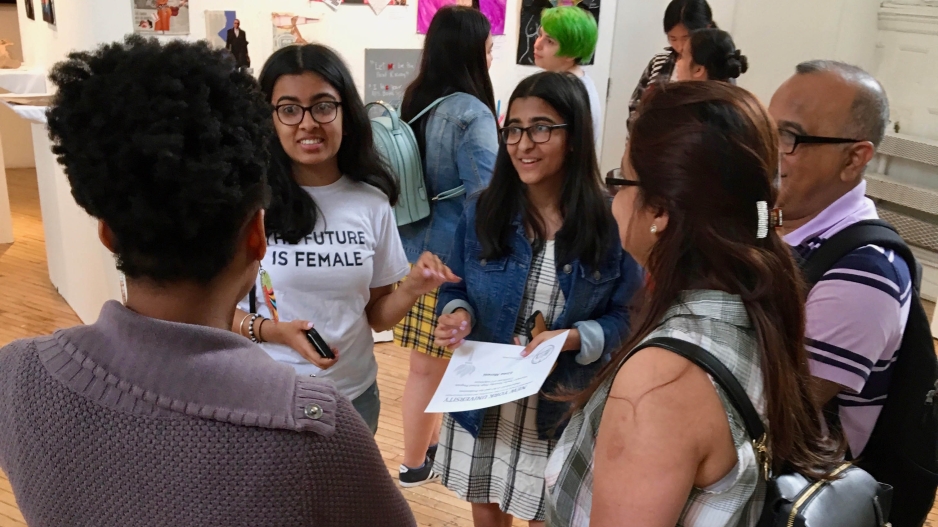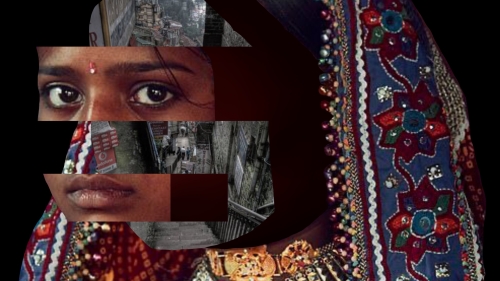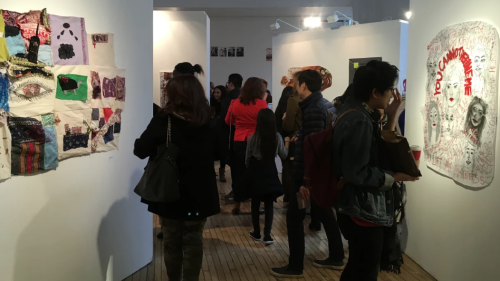
Visionary Studio: Saturday Art Workshop classes connect current social justice issues with dynamic art-making practices and media. Designed for high school students in the New York City area, participating students explore timely issues facing society such as climate change, racism and white supremacy, gender identity and bias, medical apartheid, economics, and politics by learning about the work of contemporary visual artists and drawing upon a rich array of innovative, multidisciplinary artistic approaches through which they can visually express their ideas.
Classes are taught by teams of Art Education students. Together, students and teachers consider how artists influence society. In workshop sessions, students experiment with techniques that include drawing, painting, printmaking, video, photography, 3-dimensional media, and installation to communicate their ideas about timely social and political issues. As part of the program, students participate in a final exhibition inviting parents, friends, teachers, and NYU faculty to see their work.
Classes are free and open to students with all levels of art experience!
Sessions run from 10 am to 12 pm on Saturday mornings.
High School students do not need a portfolio or any previous experience to apply.

UPCOMING DATES: Fall 2026
The Visionary Studio program will run for nine weeks from October 17 to December 19, 2026. No classes will run on Thanksgiving weekend (November 28).
The application will be available in June. Please check back for more information.
Location: Department of Art and Art Professions, New York University, 34 Stuyvesant Street, New York, NY, 10003
Classes take place on Saturdays from 10 am to 12 pm.
PAST THEMES:
From Me to We: How do artists connect the self and society?
Identity is a complicated combination of how we know and express ourselves as individuals, and the ways we are shaped by and perceived through positions including race and ethnicity, gender, economic class, age, physical ability, and many other categories. Artists have always presented themselves in their work - sometimes directly in self-portraits and sometimes indirectly by including autobiographical elements and experiences in their work. These works often critique the systems that stereotype, marginalize, or categorize people in harmful ways. In this class, students will investigate the complexity of identity and the possibilities for connecting the self to community in transformative ways through multimedia art activities that could include doing performative and public work.
The Art of Persuasion: How do artists disrupt the realities of media manipulation and propaganda?
In the 21st century, our access to and participation in media has grown exponentially because of technological innovations, corporate investment, and political interests. News and journalism, advertising, social media platforms, video games, and other media – whether controlled by corporations, public institutions or the government – are increasingly used as tools of persuasion or propaganda. Contemporary artists are critically engaging with these communication tools and new forms of media to expose the intentions and implications for new media; they also play with and creatively disrupt media. Students in this class will explore various forms of visual media, such as advertisements, social platforms, and propaganda art, and the ways that artists can play a critical role in helping us reimagine ourselves as creative media makers and critical consumers. No previous experience with technology or social media is required.
Artful Healing: How do artists shape our understanding of mental health and wellness in transformative ways?
Today, in the United States, one in five adults will be diagnosed with a mental health condition in any given year. Mental health is increasing among teenagers in the US and globally, with a recent study indicating that 1 in 5 teens between the ages of 12-18 suffer from mental health issues. Yet, this common reality remains hidden, giving rise to many misconceptions. For centuries, artists have explored the human psyche with sensitivity and empathy. Contemporary artists address the stigmas attached to mental health and offer an opportunity to use the arts to transform and heal through self-care, community care, and caring for our planet. In this class, students will explore the issues associated with mental health and wellness through the work of artists who focus on care, healing, and the creation of supportive communities.
A Place Called Home: How do contemporary artists explore the idea of home?
Is home a place, a feeling, a set of smells and tastes, a memory, a refuge? For many, the idea of home shifted during the pandemic as many people experienced a lack of safety or security, and the lines between work and home blended. This shift in the boundaries between work life and home life, requires us to question what it means to have a home in the first place. Housing instability and insecurity – the inability to pay rent due to job loss and rising costs – is a reality for many in the United States. Artists using various media represent diverse ideas about what home is and means today in our post-pandemic realities. Students in this class will explore the idea and experiences of home across realities of gender, race, culture, and class using diverse art strategies and mediums.
Those Aging Lines: How do artists explore the transformative power of aging?
As we grow older, wrinkles, lines, gray hair, and spots begin to be part of the process of an aging body. In our anti-aging culture, where the cult of youthfulness is celebrated and supported by the cosmetic industry, the natural aging process is not celebrated. Instead, the messages we hear from the media and popular culture is that frailty, loneliness, decay, and mortality define old age. Contemporary artists are exploring the ways aging in our culture is a social construction and not a natural biological process which leads to a new stage of opportunity and strength. They explore the wisdom of aging as it is followed by wealth of experience, power, wisdom, and often a triumph over social conventions. In this class, students will explore how aging is constructed and how it has changed over time in our society through the use of varied mediums and artistic methods that could include 2D and 3D materials, as well as interviewing and other collaborative forms of creative inquiry.
Questions:
Email: visionarystudio@nyu.edu

The NYU Art+Education Visionary Studios Saturday Workshop is a theme-based studio art program that addresses significant social issues and the ways in which art and artists influence society. Participating high school students choose from different themes and draw upon a rich array of innovative, multidisciplinary approaches to visually express their ideas.

Each year Visionary Studios: Saturday Workshop classes explore current issues and timely social themes. Find out more about past themes and see examples of student artwork and final exhibitions on our program blog.
Student Testimonials
From High School Students:
“I was so happy to meet people who share my ideas and want to make a change in our society.”
“ I didn’t realize how we as humans are affecting our selves and our planet. I was surprised that so many artists use climate change as a subject in their art.”
“ I learned how important it is to be an activist.”
From Grad Students:
“What I appreciated most about Visionary Studios is that both the teachers and students sustainably embraced the unknown in their respective creative work. I was working with students and we trusted each other every step of the way. That was a gift.”
